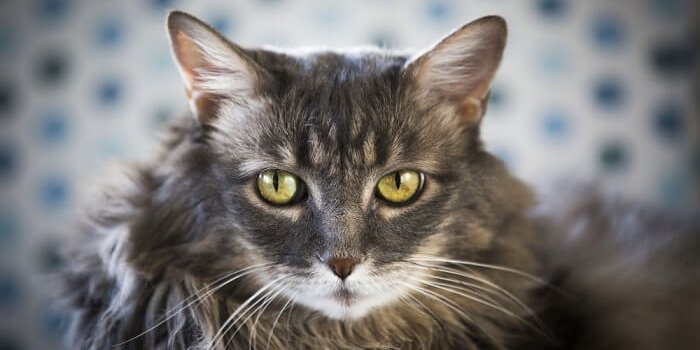
Not a cat person? Im-paws-ible! No two cats are exactly alike. Cats are extraordinary beings with unique personalities, needs, and preferences. Identifying your cat’s temperament will help you provide them with a superior quality of life.
Recent scientific research shows us how many personality types cats can have—read on to learn which type your cat is.
About Cat Personalities Traits
Several studies have shown that, just like people, personalities in cats can vary. Some are confident, bold, and sociable. Others are timid, exploratory, or fearful. Similarly, each cat behaves differently when confronted with a particular situation or event.
Let’s assess what shapes a cat’s temperament:
Genes and Environment
A cat’s personality is influenced by its genetics and the environment it’s nurtured in. Studies into maternal and paternal effects on kitten’s temperament traits revealed that there’s a paternal genetic influence with regards to friendliness towards people; kittens of friendly or bold fathers (Reisner et al., 1994) approached people and investigated novel objects more readily than those from a more fearful father (Turner et al., 1986).
The Oxytocin Receptor Gene (OXTR), which is related to a human-dog attachment, may also foretell the sociability or roughness in cats. Further studies are needed to clarify the genetic structure causing personality variability attributes in cats (Travnik et al., 2020).
Generally, pedigree-breed cats are approachable, less fearful, and more exploratory. Feral cats are more vigilant to danger and potential threats from people.
Early Socialization and Experiences
For a cat to live comfortably in your home, it’s preferable for them to experience positive interactions with people when they are a kitten. Kittens are most responsive to learning about their surroundings and their experiences can shape their response to humans for a lifetime. Likewise, kittens who have pleasant encounters with other pets are likely to get along with them more easily throughout adolescence and adulthood.
Kittens also benefit from positive exposures to a broad range of novel situations. Lack of exposure to certain sights, sounds, smells, and new people may make the cat fearful of the unfamiliar. They may avoid those unfamiliar things throughout their life by hiding away or being aggressive.
Breed Predisposition
Although cats have individual personalities, a recent study found that there’s a genetic link between cat breeds and performed behavior, particularly a link between human-directed aggression and shyness traits.
Cat Personality Assessments
Cat personality assessments consider the cat’s behaviors and emotional expressions, which are constant across time and in various contexts. Temperament evaluations are usually conducted and measured across short vs. long-term observations, across distinct tests, in addition to behavioral plus personality questionnaires, and by monitoring cats during their habitual life situations to produce personality types (Travnik et al., 2020).
What Personality Type Does Your Cat Have?
The latest research shows cats only have five personality types and all of those are influenced by their genetics and developmental upbringing.
New research from 200 cat parents conducted by Dr. Lauren Finka suggests cats only have five personality types which are influenced by their genetics and developmental upbringing.
Let’s examine what personality type does your cat have according to Dr. Finka’s study:
5 Feline Personality Spectrum
1. The Human Cat
The Human Cat is a sociable cat that likes being handled moreover share their space plus home with their owner/carer. Generally the human cat is incredibly friendly, calm and responsive towards people displaying affection through kneading preferring daily social attention. This kind of cat will cope well in a busy, lively house.
2. Inquisitive Cat
The Inquisitive Cat is eager to investigate and explore new scents, items, sights and noises within their environment which is formed by early exposure to new stimuli during the socialisation and habituation period.
This cat will thrive in an energetic environment by meeting new people and being exposed to novel events and settings on regular basis. Keep them engaged with puzzle toys, foraging boxes and cat castles.
3. Hunter Cat
A cat may press their tail to the ground as they stalk their prey.
The Hunter Cat expresses the most predatory hunting behavior by stalking, capturing, and manipulating prey. Indoor-only Hunter Cats will especially enjoy “hunting” inanimate objects like mice and feather toys. They might even present you with their latest kill as a gift! Embrace this predacious behavior to prevent boredom and dissatisfaction.
4. Cantankerous Cat
The Cantankerous Cat is the least tolerant of human handling. They are vulnerable to touch, hypervigilant about their environment, and easily frustrated. Owners of this feline should be patient, keep them comfortable, and provide a predictable home.
The Cantankerous Cat needs individual space to explore and play. They will likely be happy to interact with their owner on their own terms. Provide plenty of toys for independent play and remember to respect their wishes—no forced cuddles.
5. Cats’ Cat
Despite being a solitary species, the Cat’s Cat enjoys sharing their home with other felines. The Cat’s Cat is capable of living with related or non-related individuals if they’re socialised with other kittens or cats during the sensitive period moreover have sufficient environmental resources for every moggie.
A cat’s cat will play, allogroom and allorub it’s siblings or other cats within the house and thus will form a more harmonious multi-feline household suitable for working type people able to be left alone for extended hours.
Conclusion
Each cat has a unique temperament with a genetic link. When we choose a kitten or adult cat to live closely with us, we need to think about their individuality, species-appropriate needs together with socialisation to people involving proper handling to make sure they’re well adaptable to our family and lifestyle which in turn will help improve the human-cat bond, decrease a cat’s frustration and enhance their wellbeing.
Frequently Asked Questions
How do you describe cat personalities?
Analysis of recent research suggests cats only have five personality types although some cat parents may disagree. Three decades of research on a feline’s character have identified a multidimensional method to define cat personalities like friendliness, boldness, impulsiveness, inquisitiveness, fearfulness and more. Understanding better your cat’s temperament can assist them have the best life possible.
How do you match cat personalities to your lifestyle?
Determine if you reside a quiet, busy or noisy lifestyle with boisterous kids before adopting a kitten, likewise don’t choose a nervous, fearful kitten since it may convert into a stressed cat if your household isn’t suitable and your time poor. Lastly decide if you would like an inside only or outdoor cat that spends much time hunting and less time interacting with humans. Get the correct cat for your personal circumstances by choosing a feline companion based on its character, genetics, early encounters and behaviour rather than looks.
Is cat personality influenced by coat color?
The scientific evidence that links personality traits to a cat’s coat colour are lacking in nature. Judging a cat by its coat colour is stereotypical and detrimental to a cat’s homing prospect and welfare. Never judge a book by its cover or someone by appearance, same goes for cats!
Cats.com uses high-quality, credible sources, including peer-reviewed studies, to support the claims in our articles. This content is regularly reviewed and updated for accuracy. Visit our
About Us page to learn about our standards and meet our veterinary review board.
Care, I. C. (2018, October 04). Choosing an Adult Cat. Retrieved August 26, 2021, from International Cat Care.
Care, I. C. (2020, September 01). Module 3 Reproduction, Behavioural Development and Behavioural Health in Kittens. Advanced Feline Behaviour for Vet Professionals. UK. Retrieved August 24, 2021
Heath, J. B. (1992). Cat personalities and their origins. (A. I. Southampton, Compiler) UK. Retrieved August 24, 2021
Isadora de Castro Travnik, D. d. (2020, August 24). Temperament in Domestic Cats: A Review of Proximate Mechanisms, Methods of Assessment, Its Effects on Human—Cat Relationships, and One Welfare. MDPI, 10, 1516. Retrieved August 21, 2021.
Milla Salonen, K. V.-T. (2019, May 28). Breed differences of heritable behaviour traits in cats. Scientific Reports, 7949, 2-7. Retrieved August 23, 2021.
Salla Mikkola, M. S. (2021, July 01). Reliability and Validity of Seven Feline Behavior and Personality Traits. MDPI, 1-17. Retrieved August 22, 2021.
SandraMcCune. (1995, October). The impact of paternity and early socialisation on the development of cats’ behaviour to people and novel objects. Applied Animal Behaviour Science, 45(1-2), 109-124. Retrieved August 28, 2021.






